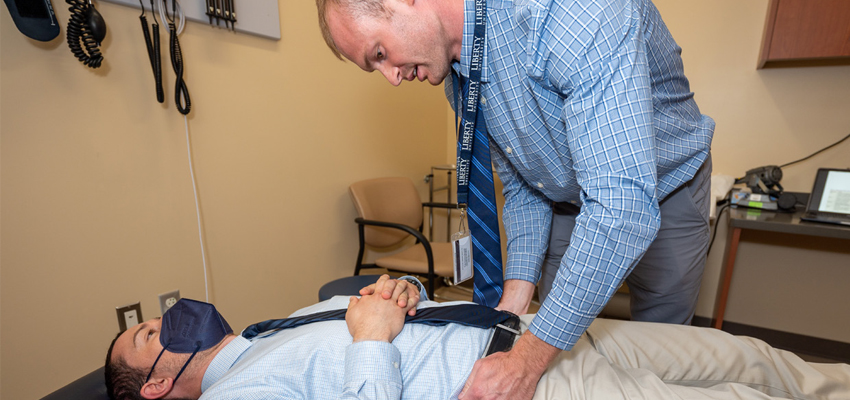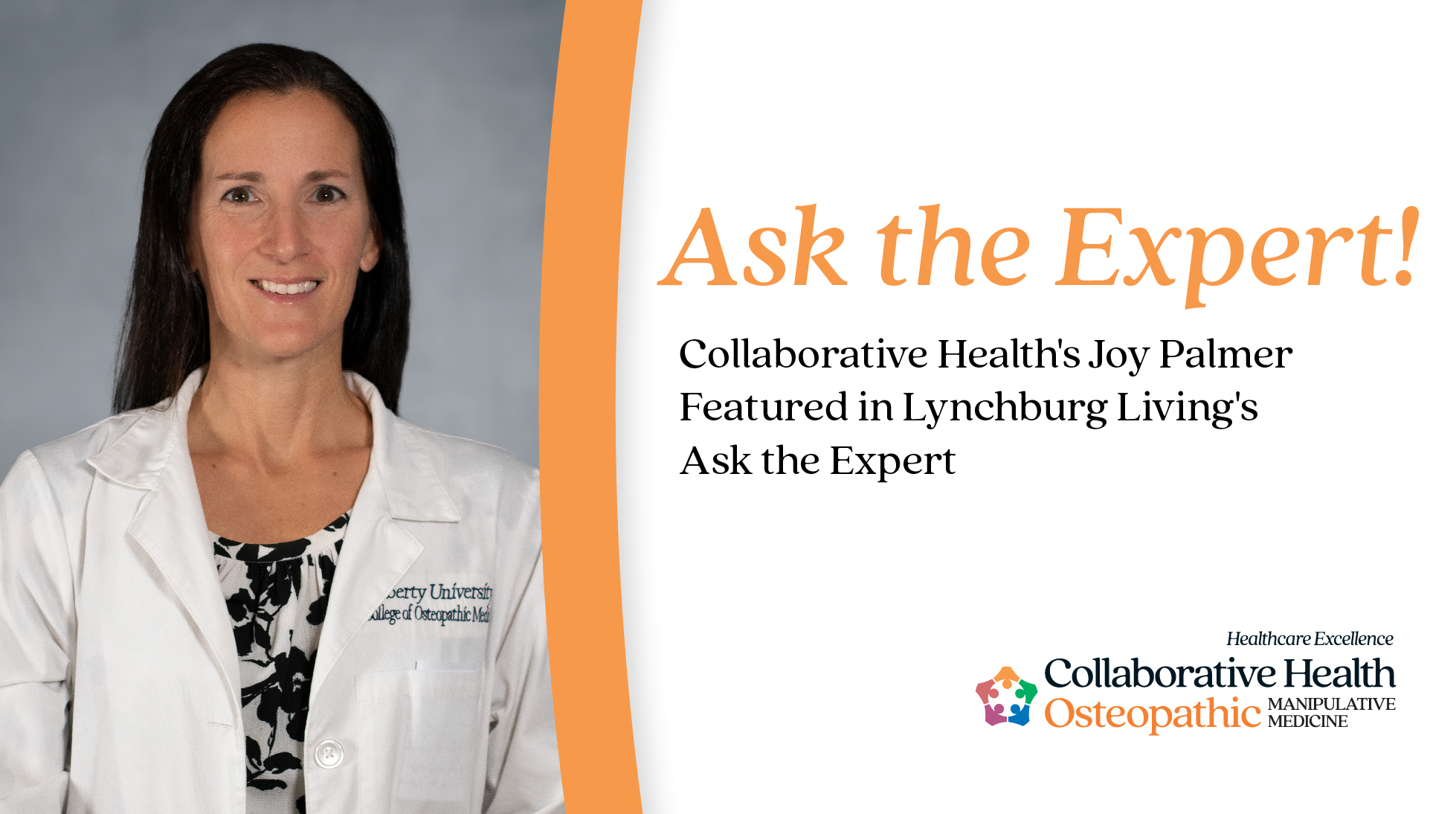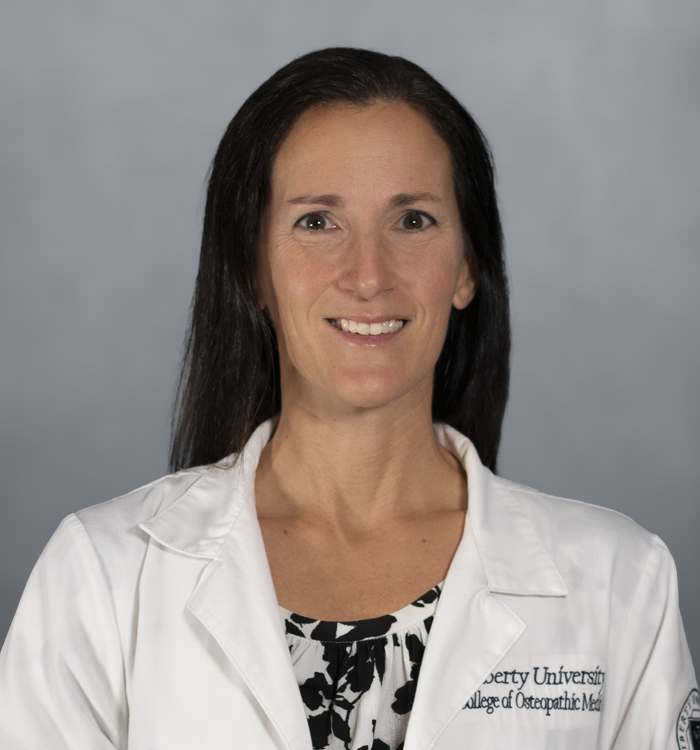What exactly is Osteopathic Nueromuskuloskeletal Manipulative Medicine (ONMM) and why do we need it? That's the question that Dr. Joy Palmer, DO was able to answer in the latest issue of Lynchburg Living Magazine. As an expert on ONMM and the board chair for the program through Liberty University College of Osteopathic Medicine (LUCOM), Palmer was the perfect person to answer these questions.
Within the column Dr. Palmer breaks down the difference between a DO and an MD when it comes to accreditation and doctors. She also takes the time to break down what ONMM is, why Osteopathic Manipulative Medicine (OMM) is so important to our body's innate ability to heal itself.
See an expanded version of the column below, with even more information for you to digest.
What is the difference between D.O. and M.D.?
D.O. stands for Doctor of Osteopathic Medicine, someone who has graduated from an Osteopathic medical school, while M.D. represents someone who graduated from a traditional, or allopathic, medical school having earned the degree, Doctor of Medicine. Both are fully licensed physicians with the ability to specialize in various areas of health care such as family medicine, surgery, pulmonology and have similar practicing rights in hospitals, the military, or the outpatient setting. The difference is in their education. From the onset of their schooling, Osteopathic physicians are trained to look for the health in their patients. They assess symptoms and physical changes through the lens that structure (anatomy) and function (physiology) are intimately related, they look at the person as being triune – made of body, mind, and spirit, and an emphasis on the body’s natural tendency towards health and self-healing. Osteopathic physicians are trained to use their hands to identify changes in the musculoskeletal and nervous systems that reflect disease. Additionally, their education includes how to perform Osteopathic manipulation, allowing them to correct areas of restriction in the joints, muscles, or connective tissues to improve the healing process.
What is ONMM?
Osteopathic Neuromusculoskeletal Medicine (ONMM) is a specialty in medicine that focuses on the nervous system and the musculoskeletal system and the integrated role they play in the human body. A physician board certified in this specialty has additional training in understanding the relationship these systems have on health and well-being. While they do recommend pharmaceuticals as necessary, they specialize in providing osteopathic manipulation to assist the patient’s response to disease and maintenance of improved health. An ONMM specialist will identify changes in how the joints move, tension in the connective tissue, amount of tone in the nervous system and use these palpatory findings as a tool to understand the symptoms the patient is presenting with. They will use osteopathic manipulation to improve motion and balance to quiet pain signaling from joints, muscles, or nerves, to improve motion in the circulatory system impacting blood and lymphatic flow, and to change neuronal reflex patterns contributing to altered physiology – such as reflux, palpitations, chronic pain messaging.

What conditions can be treated with Osteopathic manipulative medicine?
A variety of issues can be addressed with Osteopathic Manipulative Medicine (OMM). OMM can be applied to all ages because there are so many ways to engage the body to improve its function. Infants with latch difficulties, reflux, sleeping issues will present with changes in the musculoskeletal system that improve when addressed with gentle, indirect techniques. Recurrent ear infections or chronic sinusitis that may be influenced by muscles and joints impacting drainage from the ears, nose, and face can be successfully treated with OMM. Acute joint pain, chronic musculoskeletal pain, headaches, nerve pain, balance issues, lymphatic congestion are examples of conditions that OMM can improve and often resolve. In addition to Osteopathic manipulation, these specialists can provide injections to the muscles and/or joints, prescribe pharmaceuticals, and often will prescribe exercises to help the body maintain the corrections obtained through manipulation, giving the patient a tool to move themselves towards health.
How would one go about getting care by an ONMM physician?
Collaborative Health Partners Specialty Services located on Wards Road in Lynchburg is accepting new patients. They have four wonderful ONMM specialists and an ONMM residency training program ready to assist the patient in finding their health.
About the Expert
Joy Palmer, DO, serves as the program chair for Collaborative Health's ONMM program through Liberty University College of Osteopathic Medicine (LUCOM). Her medical education and training instilled a passion for discovering the place for health in patients where healing and growth are centered.
Collaborative Health serves the healthcare needs of the greater Central Virginia area, providing quality, cost-effective healthcare solutions. Specialties include ONMM, Sports Medicine, Physical Medicine & Rehabilitation, Pediatrics, Behavioral Health, Endocrinology & Diabetes, Pediatrics, and Employee Health services.
Get Specialized ONMM Care in Central Virginia Today
Are you or someone you know looking for an ONMM specialist to help you reduce pain and improve overall funciton? Look no further than Collaborative Health. Our ONMM specialists are ready to help you remove the barriers affecting your full range of motion today. Give us a call to schedule your appointment or visit our ONMM page to learn more about what we can do for you.


